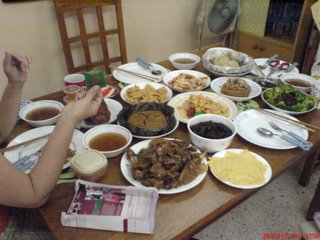 Greetings to all my fellow chinese earthlings. How was your lunar / chinese new year so far? How did this festival come about? I did a little surfing & wouldlike to share what I have found with you.
Greetings to all my fellow chinese earthlings. How was your lunar / chinese new year so far? How did this festival come about? I did a little surfing & wouldlike to share what I have found with you.
Chinese New Year (Chinese: 春節, 春节, Chūnjíe; or 農曆新年, 农历新年, Nónglì Xīnnián), also known as the Lunar New Year or the Spring Festival is the most important of the traditional Chinese holidays. It consists of a period of celebrations, starting on New Year's Day, celebrated on the first day of the first month of the Chinese calendar, i.e. the day of the second new moon after the day on which the winter solstice occurs, unless there is an intercalary eleventh or twelfth month in the lead-up to the New Year—in such a case, the New Year falls on the day of the third new moon after the solstice. (The next time this occurs is in 2033.) The Chinese New Year period ends with the Lantern Festival, on the fifteenth day of the festival. Legend has it that in ancient China, Nian ("Nyan") was a man-devouring predator beast that could infiltrate houses silently. The Chinese soon learned that Nian was sensitive to loud noises and the color red, and they scared it away with explosions, fireworks and the liberal use of color red domestically. These customs led to the first New Year celebrations.
The preceding paragraph was adapted from the following website:
http://en.wikipedia.org/wiki/Chinese_New_Year
A reunion dinner is held on New Year's Eve where members of the family, near and far, get together for celebration. The New Year's Eve dinner is very large and traditionally includes chicken. Fish (魚, yú) is included, but not eaten up completely (and the remaining stored overnight), as the Chinese phrase 年年有魚/餘; (nián nián yǒu yú, or "every year there is fish/leftover") is a homophone for phrases which could mean "be blessed every year" or "have profit every year", since "yú" is also the pronunciation for "profit". A type of black hair-like algae, pronounced "fat choy" in Cantonese, is also featured in many dishes since its name sounds similar to "prosperity". Hakka will serve "kiu nyuk" 扣肉 and "ngiong tiu fu" 釀豆腐. Because the things sound alike, the belief is that having one will lead to the other.
Adapted from the following website:
http://www.answers.com/topic/chinese-new-year
Ja neh!!!
Tuesday, January 31, 2006
CNY reunion dinner
Posted by raymond chng kwang hwee at Tuesday, January 31, 2006
Labels: school
Subscribe to:
Post Comments (Atom)
0 comments:
Post a Comment